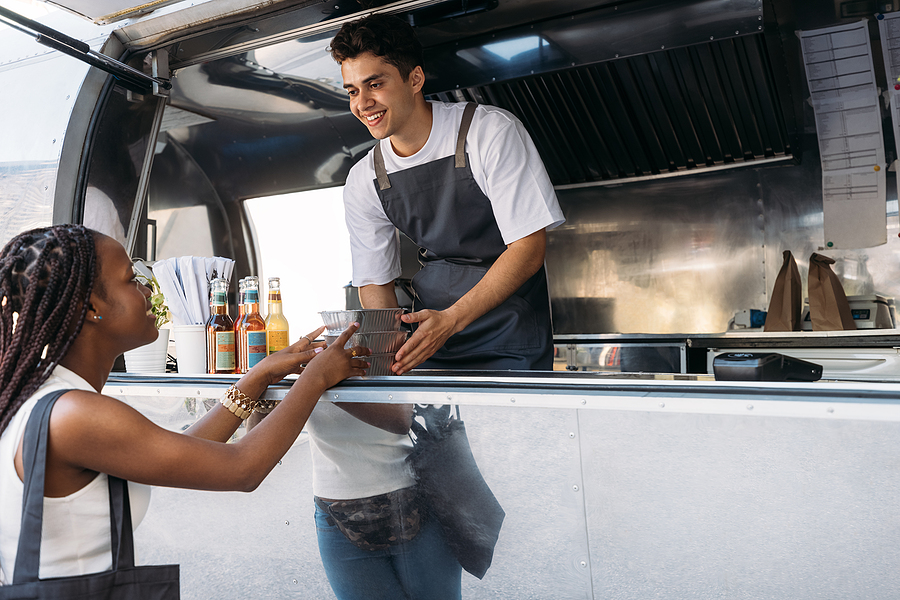The food truck industry is booming, but it’s not immune to the perils of fire. Hot cooking equipment and open flames mean that your business can be a recipe for disaster! Make sure you follow these basic safety rules to create and maintain a safe environment for everyone.
Food Truck Fire Safety Basics
Fire Prevention:
Install an automatic fire-suppression system in the truck. This can be a life saver for you, because more than 50% of food service business fires involve cooking equipment, and most municipalities require this type of installation to protect customers.
These systems automatically dispense chemicals (either water/sand mixture OR something like sodium bicarbonate) which quickly extinguish – even hot grease on grills. When the system is activated, the fuel or electrical supply is automatically shut down, so that is an added safety feature.
Make sure you have your fire suppression system inspected professionally semi-annually. You can find out relevant information from an authorized distributor, or from the manufacturer.
It is important to keep a supply of portable fire extinguishers handy, especially when cooking with fuels like grease. Class K fires are only handled by specialized Class K extinguishers and should not be used unless there has been an activation of the hood suppression system in your kitchen.
Other types will do for all other situations – just make sure you’re using them at the right time! Schedule regular maintenance on electrical equipment as well; cracks or broken switch plates could lead to dangerous situations.
Grease is the enemy! Keep an eye out for signs that your exhaust system needs degreasing. The NFPA Fire Code calls for quarterly inspections of high-volume operations and semi-annual ones in moderate volume machines. Don’t forget about monthly checks if you’re cooking with solid fuels like wood or charcoal.
Staff Training:
Ensure your staff are trained in these fire safety basics:
- Locate and use a fire extinguisher properly. PAST is an acronym used by many to remember the correct operation of a fire extinguisher: Pull out the pin, aim at the base of the fire, Sweep the extinguisher from side to side and be at least Ten feet away.
- Because grease build-up can restrict air flow, it’s important to make sure you clean up the grease regularly. Also keep walls, work surfaces, convection ovens, ranges, fryers, vents, and filters free from build-up.
- Never ever use water on a grease fire. Water will cause the grease to spatter and spread, making it likely that it could erupt into a major fire.
- Remove ashes from charcoal and wood burning ovens at least once a day. Obviously if you notice a build-up, it’s wise to empty them sooner.
- Store flammable liquids in a well-ventilated area away from food, combustible supplies, and flames. Keep paper products separate from heat sources to avoid fire hazards as much possible. Properly dispose of soiled rags/trash at least once daily along with surplus cardboard boxes or wooden pallets.
- Use chemicals correctly. Never mix chemical unless the directions advise you to, and make sure you store them properly. If you have a chemical spill, clean it up immediately.
Preparing An Emergency Plan
Keep your staff trained in emergency response. Designate one person per shift to be the Evacuation Manager, and they will oversee calling 911. When an evacuation is necessary, they will be responsible for ensuring that everyone exits safely. If you are a one-man-band: congratulations! That’s you!
Food truck vendors should not only understand the importance of fire safety but also practice it. They can do this by teaching new employees about evacuation procedures and equipment usage and giving veterans a refresher course at least annually.
Food truck vendors should understand these fire safety basics and be able to, in turn, relay them to their staff. Your responsibility extends to creating a safe environment for you, your staff, and your customers. If your company needs assistance with food truck fire safety, give the fire safety professionals at Brazas Fire a call at 505-889-8999.
